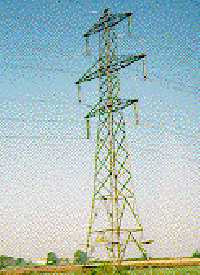 The
Changes
The
Changes
Index | Homepage | Good Links | Bad Links | Search | Guestbook/Forum
 The
Changes
The
Changes
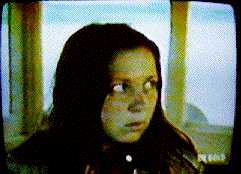
Nicky will not go near 'the bad wires'
The Changes was a BBC children's TV series first broadcast early in 1975. I found myself excitedly rushing home in anticipation from Langley Park school in Eden Park to my home in Bromley so as not to miss an episode. The enduring image for me is of menacing power pylons that emit an unbearable penetrating sound; the noise. All over England the noise is compelling people to destroy cars, televisions; in fact everything technological. If you have speakers you can listen to this .wav file of the changes' closing theme. or (not recommended due to spyware in realplayer) Realplayer .rm audio file
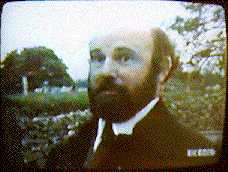
Davy Gordon, who condemns Nicky as a witch.
By the looks of it (the top of his head is missing) he could be one
himself!
After The Changes even the words for all these creations of the modern age; 'car', 'tractor', 'electricity', 'toaster', 'pylon', etc. have become taboo. Just to mention them brings on the noise and the uncontrollable anger against machines again. These items of modern technology are described by people, including the central character Nicky, as cursed.
The series was intriguingly prophetic given the 1990's phenomenon of civil disobedience against road-making machinery, power pylons and similar forms of environmental direct action. And it drew an distinction between sustainable and non-sustainable practices before the word was invented.
At one point the main character in the series, Nicky Gore, is asked whether it will induce the noise to start a blacksmith's forge. After thinking about it for a second or two she asks, "where will you get the iron from?" On hearing there is plenty of scrap lying around the farm (obviously a sensible bit of recycling) she announces that the forge will probably not invoke the noise. So the forge goes ahead. Mind you they do smash up bicycles at the start which seems rather harsh!
Nicky finds herself alone in an abandoned city where she has to scavenge for food and drink to survive. She keeps her spirits up and, with companions along the way, embarks on a dangerous journey to discover what has caused the changes.
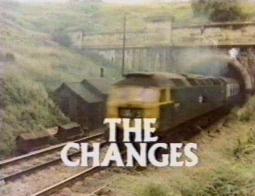 The Changes page contents:
The Changes page contents:
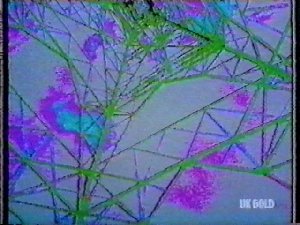
Nicky's imaginary vision of The Pylons
The Changes begins with everyone smashing up machines - cars, toasters,
televisions, everything. At the same time there are reports of freak weather
conditions. Nicky Gore's parents evacuate to France and she is left,
lost, in a nameless city to be befriended by some Sikhs who are trying
to find somewhere to live. They seem unaffected by 'The Noise', the strange
force which compels people to destroy
technology.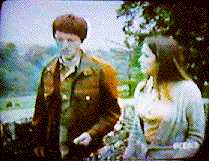
Jonathan and Margaret plan Nicky's escape
She helps them establish relations in a village, at the same time getting caught up with a band of robbers who have kidnapped all the village children. The Sikhs see off the robbers and Nicky moves on, finding herself put on trial as a witch by a disturbing, self-styled 'Witchfinder General', Mr. Davy Gordon. She escapes with the help of local children Jonathan and Margaret, and they take a boat, Heartsease, toward the source of the strange weather, with Margaret staying behind to explain their absence. Lightning hits the boat and Jonathan and Nicky swim ashore, eventually coming to a recently excavated quarry containing a deep cavern.
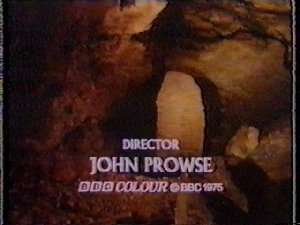
Closing credits that hint at the cause of The Changes
Mr. Furbelow, the quarry-worker, has unwittingly discovered some sort of sentient lode-stone which had once given magical powers to Merlin, and it is trying to take England back to a better time, before the Industrial Revolution, where people were more at one with their surroundings and each other. Nicky shows it the error of its ways [shame], that it is doing more damage than good, and asks that things be returned to normal. There is an explosion, the cavern is buried once more, and suddenly the roads are filled with cars again - The Changes are over.
The Changes was broadcast on Mondays 5.20 - 5.45pm from 06Jan75 to 10Mar75 on BBC 1. I remember rushing home from school to see it. There were allegedly repeats on BBC 1 18 months later and on defunkt satellite channel UK Gold in the 1990's.
The Star, played by Victoria Williams, had her eighteenth birthday while, or just after, the series was being filmed in the summer of 1973. Her solid acting is the lynch-pin of the series. She has been acting almost ever since and in 1996 was working on 'The Riddlers', a YTV series and 'Julia Jeckyll'.
The filming was done in Bristol, around Painswick and Sharpness in Gloucestershire and the cavern scenes were shot in Clearwell Caves in the Forest of Dean. [see more about locations] Clearwell do highly reccomended deep tours of their caves from March to October. You can call them on (01594) 832535 for details.
The BBC have never released The Changes on video. Somewhat shabby for an organisation whose charter remit is 'public service' and who invested so much of our licence fee into the production. If they ever reply no doubt they will blame 'contractuaral difficulties'. The same excuse they used for not releasing the VHS or DVD of 'Cathy Come Home' when in fact it was because they only offered author Jeremy Sandford £0.07p royalty per video. Now Jeremy has sadly died the video and DVD of Cathy Come Home has been released.
Instead the BBC seem to be doing their best to 'bury' The Changes in obscurity and have so far ignored all my letters and not returned my phone calls on the subject. The series' subject matter may be too apocalyptic for them to release and contains 'dangerous ideas, thought crimes' such as that cars and other technology might be 'cursed'.
This series marked another high-point of the 'golden age of television'. A highly intelligent, exciting programme with a dedicated writing and production team questioning so many of the values we take for granted today. It is a more engaging series than many adult dramas today, giving a valuable insight into the Sheik world for youngsters into the bargain. Master copies of The Changes sitting gathering dust on the BBC library shelf illustrates a further way in which the 21st century BBC has lost its way. Far from gripping drama it produces too much wooden establishment propaganda.
So, as my small way of prompting the BBC not to sit on these tapes for ever - they may even destroy or 'lose' them as they have done with much brilliant sixties and seventies TV (see Dick Fiddy's incomplete book Missing Believed Wiped) - I am happy to send a four hour tape of the entire ten part series to anyone who is itching to see it again. [see page about the videos I sell] The quality's not brilliant, but good enough not to spoil your enjoyment.
Please send a cheque or postal order for £10.00 sterling payable to 'Tony Gosling'. Alternatively, if you're hard up, send a fiver (£5.00 sterling) and a blank E240 (4 hour) VHS tape. I suggest Recorded Delivery if you send cash. Full details on my VIDEOS page. If you've not received the VHS within two weeks give me a call.
Joe Mahoney for yes, it was he who decided these things
BBC Video and DVD
Room A3144
80 Wood Lane
LONDON
W12 OTT18th April 2002
Dear Mr Mahoney,
I would like to formally request the VHS and/or DVD release of the 1970's BBC children's TV series 'The Changes'. Web pages about the programme have proved popular and I am certain there would be more than usual demand for the tape(s) from adults and children alike.
If you are in any doubt I suggest you view the opening scenes from the series yourself. It only takes a minute or so to get going.
Many thanks
Tony Gosling
cc. Mark Campbell - Skonnos Magazine
From: UKGold [mailto:ukgold@bbc.co.uk]
Sent: 12 May 2006
Subject: RE: The changes
Thank you for contacting UKTV Gold.
At present there are no plans to screen "The Changes" on UKTV Gold. Primarily this is becasue our channel tends to focus on more contemporary material. However, i have forwarded your comments to our UKTV Drama channel who may be interested in screening the series at a future date.
Yours sincerely,
Richard
UKTV Gold
In the opening titles, the train shoots out of the Box Tunnel, west end, between Bath and Chippenham. Cars rush across Severn suspension bridge, now the M48. Presumably filmed from Severnview motorway services. The cave in the closing credits is part of Clearwell Caves in the Forest of Dean.
Severn Bore. Shots in the Mendips - Clifton Wood? Nicky's House is in Cornwallis Crescent, Clifton. The turmoil happens in Southville, South Street, South Street School, Totterdown, St Lukes Crescent and St Lukes Road, up to Pyrtle Hill Grove. Long view is Richmond Street, Totterdown. Nicky's parents take road between Sandy Bay and Weston-super-mare, departing for France in Weston, Anchor Head (wrong coast!). The Oxford pub, Oxford Street in Totterdown, is where Nicky scavages for food. She talks to the old man just below the Royal Crescent, Sion Hill, The Paragon. All in Bristol.
Scenes in Knowle Road and Bayham Road. Perretts Park, Totterdown.The Seikhs appear in St. Lukes Road, Totterdown, at the junction with Richard Street. Then Belvue Crescent and Ashton Court Estate. Trekking through the Mendips.
This section compiled by 'Peter'.
During a discussion at my local pub about Children's TV in the 70's, I remembered that part of the series was filmed near me. No one else even remembered it!
Specifically the Sikh encampment in episodes 3 & 4 was filmed in the, blink and you miss it hamlet, of Bothampstead in West Berkshire close to where I lived at the time. I remember the setting up of the camp for filming at Bothampstead Farm when I was 11 or 12 - probably 1973 but may have been 1974? Also the opening scene of Vicky and the man wheeling the wheelbarrow with all the tools that needed repair was on the Hampstead Norreys to Bothampstead Road.
The Google Earth Map reference for the farm camp is 51" 29' 00.00 N & 1" 16' 23.00 W
Unknown
Unknown
Unknown
Davey Gordon goes in the drink at the Lower Purton Lock, Sharpness Canal.
Penvann, Wales?
Bixslade Valley , Forest of Dean.
In and around Clearwell Caves, Forest of Dean. For information on visiting the Caves, go to http://www.clearwellcaves.com. The owner of the Caves at the time of filming, Ray Wright, is still there. Address: Clearwell Caves, nr. Coleford, Gloucestershire, GL16 8JR. Tel: +44 (0)1594 832 535, Fax: +44 (0)1594 833 362, Email: jw@clearwellcaves.com.
For quality info. on the series get hold of a copy of October 1996 'Skonnos' magazine which includes exceptional interviews with writer, Peter Dickinson; producer, Anna Home; composer, Paddy Kingsland and the star, Victoria Williams. The interviews make it clear that controversy surrounded the production. Anna Home, who is now head of BBC Children's programmes, gives painfully short answers and comes across as distinctly uncomfortable talking about the programme. Incidentally - in her book 'The Box of Delights' about childern's television she writes only a couple of lines on the series, describing it as being about a "post-holocaust Britain that had reverted to medievalism, a world in which machines were wicked" She also gives the location of the cave scenes as Clearwell Caves in the Forest of Dean.
MARK CAMPBELL INTERVIEWS THE STAR:
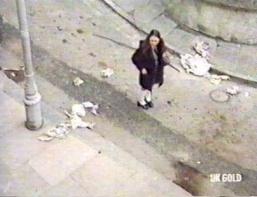
THE CHANGES' ever-changing guest cast meant that Victoria Williams
- or Vicky, as she was then known - played the only character that featured
in all ten episodes. Her role as Nicky Gore was central to the success of
the series - her quiet, naturalistic performance offsetting the surreal and
often frightening storyline.
It's an odd experience interviewing the star of a programme that affected
me so strongly as a child, and I'm grateful for Victoria's friendly welcome
and hospitality to me. Despite her work in the theatre and on TV (appearing
in the mid 70's on CORONATION STREET as a dishonest youth club leader),
I had seen very little of her work since THE CHANGES and foolishly
had a mental picture of her as a teenager. I was therefore a little surprised,
upon arriving at her North London flat, to see she'd grown up somewhat!
I'm indebted to her for lending me photos from the programme, and for being
such an entertaining interviewee.
SKONNOS: - How early did you get into acting?
VICTORIA WILLIAMS: - Very early. I was twelve. I went to grammar school and was very badly behaved - I was a totally impressionable child and got in with a bad crowd. But my nice friend from primary school went to tap-dancing classes at the Corona Stage School, so I went with her to tap dancing classes and they offered me a free place there, which was pretty lucky as I was about to be expelled from this grammar school for behaving so badly! So it obviously worked out as it was meant to be.
So how did you get the part of Nicky in THE CHANGES?
Well, I can't remember specifically. I presume I would have just auditioned. At the time I was quite successful. I had done quite a lot of television and I was quite in demand, which was rather nice. So there was a whole flurry of jobs and that was one of them.
Can I ask you how old you were when you did it?
I was seventeen. Yes I think I was playing fourteen or fifteen but I was actually seventeen.
Was it hard being the central character, in terms of learning lines?
I don't remember it being hard work. I remember there being one or two sticky moments, but it was quite a long shoot - I think four or five months. It was quite demanding but I think I was used to it. I remember the people with affection, I remember it being good fun.
Can you remember roughly when it was filmed?
Yes it was filmed in the summer of '73. I think I even had my eighteenth birthday on the shoot, or just after.
Some of it was filmed in Bristol wasn't it?
Bristol and the West Country, yes. A lot of it is in the Cotswolds, it was lovely in the hot summer. And there was one village down there, which funnily enough my sister and I drove through the other day, and it's a protected village - it has no telegraph poles and you can believe you are in rural England again. Very pretty, near Painswick in Gloucestershire.
So naturally you weren't still at school at the time?
No. I'd left school at fourteen, ill-educated. No education at all I'm afraid!
What was it like working with such a large, changing cast?
It didn't seem to be too large, I suppose because week by week people came in, and of course the crew were constant so they were all my buddies.
Was it filmed in sequence?
Yes, it was. It was recorded in story order. I remember I got very fat on location because you get fed five meals a day.
I would have thought with all that walking about you would have lost weight.
No, I didn't, I put nearly a stone on. But I nearly drowned....
Was that when you jumped into the water?
Well, it was fine jumping into the water when the boat exploded, but it was filmed so that the boat was sticking out on this promontory but from where they were filming across the water it looked like it was in the middle of the river. In fact we were only about ten feet from the beach, and then we had to splash and swim across to the camera. And apparently they had recced a lake and it was two feet deep, so I could just pretend to swim across. Well it was two feet deep for about ten feet - and then it was bottomless. There were reeds around our necks, and I had dungarees, Wellington boots, a T-shirt and a big cardigan on. I realized I was in trouble, so I tried to get the cardigan off and it stuck on my arms and my elbows, so it was dragging me down. The cameraman dived in and came and rescued me! I mean I was going under for the third time. I don't think anybody quite realised at the time, we were all in shock, but it was really very, very badly organized.
It looked good...
It was very scary.
There was a burnt out wreck behind you - presumably a different boat to the one you jumped from.
I don't remember. I must have been in shock at that point.
Did you read Peter Dickinson's books first?
Yes.
What did you think of them?
I liked them. I haven't read them for a long time actually. I read them a couple of times, and in fact just recently I gave them to my god-children to read, so I don't think I've even got a copy any more. But yes, I enjoyed them, I think they're good books. When I saw THE CHANGES on the telly I was surprised how well it held up - it looks great still, doesn't it?
The scene where Ajeet is teaching you to speak Punjabi looks very naturalistic - with you trying to get your tongue around the words.
She couldn't speak Punjabi at all! (Laughs)
The ending seems to have caused problems. Were you happy with the resolution?
I remember talking to the rock, and Necromancer's weather... I can't remember - does everything just go back how it was? Bit of a cop-out isn't it.
You persuade whoever it is that he shouldn't be doing all this, and everything goes back to normal.
Yes, I think there should have been some kind of pay-off with lessons to learn for the environment.
I think you do say something along those lines to the character of Jonathon (Keith Ashton), but your answers are pretty open-ended.
Yes.
Paddy Kingsland mentioned a studio session being booked - were you involved with that?
No, I don't think I did anything in the studio. We did the ending in caves in wales.
What are your main memories of the filming?
I remember bits and pieces. I remember giggling in a hotel room with my friend Rebecca, being naughty, skulking, and hating that horrible man, the First Assistant. We were doing some filming and I was in this ditch and it was wet and freezing cold, and I was dying for a pee, and he made me wait two hours - I wanted to hit him! All I wanted to do was go round a bush so I could have a pee, and he wouldn't let me. I mean, thinking back now how ridiculous that is, now I would just go, but when you are young you kind of think "I'll do what I'm told". And, I mean, it was terrible the incident about the boat - I nearly drowned, which was terrible, and everyone was all a bit sort of inadequate about it. No-one ever apologized. I mean it wasn't anybody's fault, of course, but it was a terrible thing to have happened. It really was a major cock-up.
The series could have been severely curtailed...
It certainly could've been. And what would they have done then? What else do I remember? I remember the filming in the Cotswolds, and my mum came up a few times which was really nice... I have generally rather pleasant memories of a nice job. But I was a bit of a strange child, I was quite used to being professional. I think probably in retrospect like most things I wish I'd been a bit more 'concentrated' and 'present' but I think I probably did quite a good job. It was alright you know.
Definitely. Did you watch the series when it went out?
I think I did. I don't remember specifically, but I think I did, yes.
Did you get fan letters?
Yes, I did get quite a few letters. I don't get a lot of letters generally, just dribs and drabs.
The writing was quite powerful.
It was, wasn't it. I don't think I quite appreciated it at the time. It was up for awards and things, and I don't think I appreciated that.
What did you do after the series finished?
I went on holiday to Morocco with my friend Maurice, the ASM, who was a good buddy, and then I went travelling. What was my next job? I can't remember. Loads of things.
You've been acting since then?
Yes, right the way through. I've done loads of things - 500 odd tellies.
Any childrens' things?
No, not really. Lots of dramas, sitcoms, not a lot of theatre, mostly television. I do something called THE RIDDLERS for YTV, I don't know if you've ever come across that? How old are your kids?
Ben's one, and Emily's three.
So Emily might watch it. It's Thursdays at 3.30. I've done that for seven years, and JULIA JECKYLL I did last year. 25 episodes we did, and we're doing another 15 this year. And 25 RIDDLERS this year.
Victoria Williams, thankyou very much.
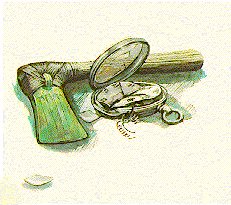
The Changes Trilogy by Peter Dickinson is where the series started. It is predictably out of print in the UK even though it's still in demand (it has been on order by other people in the two bookshops where I tried to order it). The staff at Puffin (Penguin) said it was due for a reprint in December 1999. Liars have the copyright.
It was published originally as three separate books The Devil's Children, Heartsease and The Weathermonger (that's the order to read them) and then as The Changes Trilogy. Nicky Gore only features in The Devil's Children.
Peter Dickinson says the plot for The Weathermonger, which was written first, came to him in a nightmare. This, the last book of the sequence, is very different to the portrayal in the series.
It opens with a young boy with weathermaking powers being hounded out of England with his little sister. They make a successful dash for France where a General interviews them and sends them back to find the source of the changes.
The children come back to England and take a Rolls Royce from Beaulieu motor museum to drive to the source of the changes, the Nigromancer. They find that Merlin himself is causing the changes and had been woken by Mr. Furbelow who has the magician hooked on morphine so he can, to some extent, control him.
The children contrive for Mr. Furbelow to have an accident so they have to go down into the cave to administer Merlin's shot of morphine for him. They explain to the hairy old man that morphine is a poison and that it is killing him and when they hand him the syringe he slowly crushes it. He thanks them and asks them to leave.
Withdrawal from the drug is traumatic for the children, with buildings falling down and animals going mad, but Merlin successfully buries his cavern under rubble and when the French General arrives they make up a story to successfully cover up Merlin's involvement .
The other books and eventually the TV series sprang from The Weathermonger. The Devil's Children is, to my mind, the best written of the three.
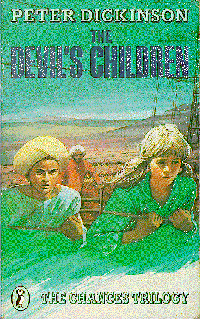
By the time Nicky had brought Mike hobbling up and settled him in comfort in the dust, Ajeet had told the news. Nicky turned towards the tree, put her palms together under her chin and bowed. The old lady did the same on her cushions, just as if Nicky were an important person come from many miles away to visit her. The old lady rattled a sharp sentence at the children who'd gathered to listen, and they scattered.
Ajeet said 'My grandmother wants the boy to tell his story again.'
Mike was staring at the old lady with quivering lips. Nicky remembered how terrified she'd been when she first faced those brilliant eyes.
'He told me that robbers had come to the village,' she said. 'They'd started herding the children together and taking them somewhere. He was in bed with his bad foot, and his mother smuggled him out of the back door and told him to come to us. He said the robbers had killed the big man. Do you know any more, Mike?'
'My Mum said they was on horses, in armour,' he whispered.
Ajeet translated. Mike couldn't remember any more. He'd seen nothing himself, though he'd heard the cries from his bed, and the church bell ringing its alarm and then stopping.
The old lady spoke to Tara Deep, the mother who'd been looking after the crèche. She nodded and began to walk up to the ploughmen, quick and graceful in her blue sari. The old lady spoke directly to Nicky.
'My grandmother wants to know what you think we should do.'
'First we've got to make ourselves as safe as we can,' said Nicky, 'and then we've got to find out more, how many of them there are, and what they're going to do next. We can't decide anything until we get more news. The only thing is, the robbers won't mind crossing the bad wires - they must have passed things just as bad to get to the village at all.'
'I just shuts my eyes and ducks under,' said Mike.
'The farmyard's almost a fort already,' said Nicky. 'We could get food and water in, and the sheep, and strengthen it. And as soon as it's dark I'll go down across the fields and try and find somebody I know. Mr. Tom's house has its back to the school playground, and then there's a path and then fields, so I might be able to get to him without going through the village at all. After all, we aren't really sure that Mike's got his story right - his mother must have been very hurried and worried.'
Ajeet had been translating as Nicky went along. The old lady raised a ringed hand, palm towards Nicky in a sort of salute, and answered. Ajeet laughed.
'My grandmother says that you will make a very good wife for a soldier some day,' she said.
Nicky nodded, unsmiling. She was frightened, of course, by what she had suggested, but another part of her felt a strange, grim satisfaction in the risks and dangers. They would force her to rebuild the armour round her heart, which during the last few weeks she had allowed to become so full of chinks and weaknesses. She bowed her head and stared at the scuffled dust; at the thought of the coming action her heart began to hammer - as though there were a small smithy in there, retempering the rusted steel.
By now the men were trooping down from the field, talking excitedly and looking north-east across the swooping acres to where the church tower stood peaceful among its limes. The women called their own children to them as they came, and cajoled them into stillness and silence. A big orderly circle gathered under the wych-elm, the men stopped chattering and the old woman spoke. Nicky heard her own name jut out from the fuzz of Punjabi; heads turned towards her. Then, as usual, twenty voices broke into argument together; the old lady screeched, and Uncle Jagindar was talking alone. Voices grunted agreement. He turned to Nicky.
'This sounds dangerous,' he said, 'but we can send a guard with you.'
'I don't think it's very dangerous,' said Nicky. 'If they catch me, they'll think I'm one of the village children and put me with the others as a hostage. But I don't see why they should - they can't watch the whole village, all the way round. If you do send a guard, you won't have so many men for the defence up here, supposing they decided to attack tonight, which would be the sensible thing for them. It'd be a waste of our men. You'll need sentries all night, too.'
She could see heads nodding.
'Perhaps Gopal could come with me,' she said. 'Not to fight or anything, but to bring back news if I do get caught. The thing is, I'm sure I'm the only person Mr Tom or any of them would talk to, so it's no use any of you going. They're a bit scared of me, but not half so much as they are of you. That's right, isn't it, Mike?'
'Yes, that's right,' he whispered, staring round at the dark and bearded faces.
'And we've got to know, haven't we?' she said. 'We can't decide anything till then.'
Uncle Jagindar wheeled to the ring of Sikhs.
'That is agreed, my friends?' he asked.
'Agreed,' boomed the council.
He started to allot tasks in Punjabi. Gopal came, serious- faced, to Nicky.
'Our job is to eat and rest,' he said. 'Mike looks as if he needed a rest too.'
The boy nodded, but they had to help him to his feet and support him, swaying, down to the farmyard. Already the water-carriers were bringing bucket after bucket from the clanking well, while the carts creaked up from the farm house with larderfuls of dry stores and tins. Sacks of charcoal were carried in from the smithy, for cooking, and mounds of hay down from the big barn for the sheep. Soon the sheep themselves flooded, baaing with amazement, into the bustling square. The cooped hens were trundled up the lane; barrows of blankets and bedding came from the houses, sacks of new corn from the storage towers. The old lady was ensconced in an open stall, and the holy book carried reverently in from the bungalow.
As dusk fell the courtyard was still a shouting and bleating and cackling confusion. The communal supper was going to be very late, cooked on the faint-flamed and smokeless charcoal instead of the roaring logs they'd used when they first spent a night there. But Nicky had already eaten; her fair hair was covered with a dark scarf, she wore a navy- blue jersey and a pair of dark grey trousers belonging to Gopal; she would have liked to blacken her face, but could imagine the effect on an already terrified Mr Tom if a dark face hissed at him out of the night. His was obviously the first house to try,
After the clamour and reek and dust of the courtyard, the dewy air of nightfall would have seemed bliss to breathe if her heart hadn't been beating so fiercely. Gopal eased his sword in its scabbard, then frowned at the slight click. They stole down the familiar lane side by side. Mr Kirpal Singh, crouched by a lone bush on the bank, whispered them good luck. (Five sentries watching for two hours each; everyone was going to be very tired tomorrow.)
There was a copse on the right of the lane below the bad wires. They headed south beside it, and on up the slope under the cover of a hedge which had not been hauled out because it marked the boundary between two farms. After two hundred yards they turned east again, leaving the hedge to slip like hunting stoats along the edge of a stand of barley. There was no hurry. The night was still dark grey, and Nicky didn't want to reach the playing field until it was fully black. So where the barley stopped, because that was as far as the reapers had mown, they lay on their stomachs, trying to suck the last inch of seeing out of the shortening distances, peering and listening for dangers. A lone pheasant clacked in a copse to their right.
'They cannot post sentries all round a village as big as this,' whispered Copal. 'Not unless there are hundreds of men. In any case they do not need to defend the whole village now that they have hostages. They will guard the place where they have set up camp, and then perhaps they will send out patrols. That is what we must watch out for.'
Beyond the reaped stubble was a pasture field where cows stumbled and snorted, invisible from twenty yards. Knowing what inquisitive brutes cows can be the children steered to the right where an extra loom in the dark promised the shelter of another hedge. But when it came it was double, and a lane ran down the middle. Nicky shook her head - such a path was a likely route for a patrol. They scouted left, and the lane bent at right-angles; flitting through a gap in the hedges, they found themselves once more at a place where unreaped wheat ran beside stubble, and ran in what Nicky, even after that bout of dodging, still thought was the right direction. Then another lane to cross, and empty pasture beyond. It was too dark to see more than ten yards now.
After a whispered talk, Gopal dropped behind and Nicky tucked a white rag into her belt for him to follow her by, like the scut of a rabbit. (If they were chased, she'd have to remember to snatch it out.) Darkness made the middle of fields seem safer than hedges; but coming in darkness to the village, by this unfamiliar way, she might easily have missed her direction. The wind had been steady from the south west all day, surely. Just as she decided to stop and reconsider, the church clock began to clang sweetly to her left. Eight. More to her front, but further away, urgent voices yelled. In the fresh silence the tussocky grass of the pasture seemed to swish horribly loudly, however carefully she moved her feet; anyone waiting in the coming hedge would be bound to hear her - though she couldn't hear Gopal ten paces behind her. Encouraged she stole forward.
This hedge was double too, but the path down the middle was only a yard across. So she knew where she was, at least; this was the footpath that ran south between the church and the school. The nearer hedge was strengthened with the thorny wire she hated so much. As she squatted and wondered whether there'd be a gap further along, Gopal edged quietly up beside her.
'Barbed wire?' he whispered. 'Wait a moment.'
He crouched by the fence, holding some sort of tool in his hand. Two clicks, and he dragged a strand of wire away.
'My very own notion,' he whispered. 'Wire cutters. You can crawl through now. Is it far from here?'
'Only across the playing-field.'
'Then tie your rag to the other hedge so that we can find the place coming back.'
Most of the householders in the council estate kept a dog, but Mr Tom preferred his scarred old tabby; so if they came up straight behind the right house there oughtn't to be any barking. Nicky lay in the sodden grass and tried to make out the roof-lines; Mrs Bower's chimney, next door, had a big hunched cowl. So ...
Only firelight showed through his back parlour window. Nicky edged an eye above the sill,. hoping that he hadn't gone to bed yet. No. He was curled by the dying fire, his head in his hands but held so low that it was almost on his knees; he looked very old and beaten. Nicky tapped cautiously on the pane. At the third tap he looked over his shoulder like a haunted man, and, then put his head back between his hands. She kept on tapping, in a steady double rhythm which couldn't have been caused by anything accidental, such as a flying beetle. At last he staggered from the chair, crossed the room and opened the window half an inch.
'Who's there?' he whispered.
'Me. The girl from the Devil's Children. I want to talk to you.
'I'll have nothing to do with you,' he hissed, and tried to shut the window. But Nicky was ready for him and jammed the hilt of her knife into the crack.
'We want to help you,' she whispered. 'But we can't until we know what's happening.'
'How many o' you's out there, then?'
'Only me and a boy. He'll rap on the window if he hears anyone coming.'
'OK,' said Mr Tom after a pause. 'I'll let you in.'
'I'll climb through the window,' said Nicky. He opened it wide and she flicked herself through. The moment she was in he fastened it tight, while Nicky tucked herself into a corner where she couldn't be seen from outside.
'Sit like you were sitting before,' she suggested. 'Talk as though you were talking to yourself. Mike Sallow came up to the farm and told us that robbers had come to the village and killed Mr Barnard and taken all the children some- where.'
'True enough,' groaned Mr Torn. 'They killed the Master. I was there, waiting for the fun of seeing him drive 'em off, but there was three of them on horses, wearing armour. They charged him down and skewered him through and through, so's he never got not one blow in with that sword of his. And then they put his head off and stuck it on the pole of the Five Bells, for the wide world to see what manner of men they are. And herded all the children together, all as they could find, and took 'em down to a barn behind White House; and they put 'em in a loft with a pile of hay and timber down below, and they made old Maxie cry through the streets that they'll set fire to the whole shoot if they have a mite more trouble out of us during their stay.'
'How long will that be?' said Nicky.
'As long as there's a morsel left to eat, that's my guess. And the Master was that set on us coming through the winter short of starving that we've barnfuls of stores waiting. You mark my words, we'll have 'em for months yet.'
'How many of them are there?'
'Thirty. Maybe thirty-five.'
'But there must be more than a hundred men in the village!'
'I know what you're thinking, girl, but they fell on us that sudden, and we hadn't nothing to fight 'em with, save a few cudgels. The Master, he'd been set on getting us swords, so he could have his own little army, but your folk wouldn't make 'em for us, remember? And these robbers come with spears, and horsemen in armour, and now they've got the children - though I've none of my own, thank God - and we're bound hand and foot, hand and foot.'
'Do you think they'd actually burn the children if there was trouble?'
'I don't know, a course; but I do know they'd do something, and something pretty cruel, too. There was one of 'em, one of the ones on horseback, and while the footmen were hacking off the Master's head I saw him throw back his helmet and wipe his face. Curly hair, he had, and a broken nose, though he was scarce more than a boy. And when he saw Arthur's head dripping up there on the pole, he laughed like a lover. Like a lover in spring. I slunk away and come back here, and the rest I know from Maxie's crying.'
He had been half out of his chair, glaring round the room as he tried to tell her the horror of his story, but a faint rap on the window made him shrink and curl like a snail. Nicky made a dart for the window, heard the footsteps, knew it was too late and slid herself under an old Put-U-Up bed where she lay, barely breathing, against the wall. A hard fist thundered at the front door. She could see Mr Tom's feet rise from the floor, as though he were trying to curl himself even further into his chair.
'Go and answer him,' whispered Nicky. 'It'll be worse if you don't.'
The feet doddered back to the floor. The legs stumbled past the dying fire. Then a bolt was drawn, slap. Then voices.
'What's your name, Gaffer?'
'T-t-tom Pritchard.'
'Tom Pritchard, eh? Fetch us each a mug of ale, Tom Pritchard.'
More than one of them, then.
Shufflings, another door moving, palsied clinking of glass, more shufflings. Silence. Then the smash and tinkle of deliberately dropped tumblers.
'We hear you were a crony of the big man's, Tom Pritchard.'
'N-n-no, not me. He broke my fork a-purpose.'
'What do you know about the lot they call the Devil's Children, Tom Pritchard? We hear as you had dealings with 'em.'
'N-n-not much. They live up at Booker's, t'other side of the bad wires. Three months back they came here. I had a bit of dealing with the girl as lives with them. She's an ordinary girl, to look at. The Master wouldn't have none of 'em but her in the village, and then only to do dealings in smith- work. They make and mend iron for us, they do, and sometimes I helped with the dealings. I never seen none of the others, saving the girl.'
'Ah.'
A low discussion.
'What are, you doing still dressed this time o' night, Tom Pritchard ? Thinking of going out, eh ?'
'I ... I couldn't sleep. I was sitting by the fire. I hadn't a light showing. I heard the orders.'
'At least you ain't deaf, then, Tom Pritchard. Well, it's time good little gaffers were in bed, even them that can't sleep. I want to see you going up them stairs, Tom Pritchard. You can sleep now, gaffer. The Devil's Children needn't fright your dreams no more, not now we're here to look after you. We'll nip up there and sort 'em out for you, soon as we're settled. Up you go now, like a good gaffer.'
A grunt, and the stumble and thud of Mr Tom being shoved so hard along the hallway that he fell. Slow steps on the stairs. More talk at the porch, then footsteps coming, but turning off through the other door. A curse as something fell from a larder shelf. Voices in the hallway.
'Nice drop of ale they brew, leastways.'
'Yeah. Cosy old spot to winter out. Scour around for rnore hosses, get them Devil's Children to run us up armour for the lot of us.. .'
'How'll you manage that, then?'
'Same as here. Devil's Children got children of their own, ain't they ?'
Laughter.
'Be getting along then. Hey, Maxie, who's next?'
The crow of the clerk's voice from the street, shrill with terror.
'Sim Jenkins, sir.'
Heels crunching through the broken tumblers on the doorstep. Going.
Nicky lay in the stillness and counted two thousand. She had an instinct that the robbers were the sort of people who would do the thing properly, when they wanted to scare a village into obedient terror. They wouldn't leave Mr Tom quivering in the shameful dark without letting him know that they were still keeping an eye on him. And sure enough, when she was in the sixteen hundreds. another light tap came from the window. Thirty seconds cater the front door slammed open, feet drummed on the stairs, more doors crashed and banged upstairs, and the hard voice shouted 'Just come to tuck you up, gaffer. See that you are in bed, eh? Sweet dreams.'
Feet on the stairs again, and the door walloping shut, and the crunched glass. Then the dreary business of starting once more at one, two, three ...
She was so stiff when she edged the window open that she had to clamber through like an old woman. Half way up the garden Gopal floated beside her from behind the runner beans; he touched her cheek with his hand in gentle welcome, then led the way back across the school playground to where the faint whiteness of their rag in the hedge marked the cut wires.
They took the journey home as carefully as they'd come, but nothing stopped or even scared them until their own sentry hissed at them out of his hiding and made their tired hearts bounce. Though it was well past midnight, every adult Sikh was awake and waiting in the dark farmyard. Nicky told her story in English, breaking it into short lengths so that Uncle Jagindar could turn it into Punjabi for the old lady. The pauses while he spoke enabled her to think, so that she left nothing out. When she had finished, five of the men crept out to relieve the sentries; for them she told the whole story all over again. Now every Sikh knew, and Nicky could sleep.
They held a council as soon as breakfast and the morning prayers were over. Daylight meant that Gopal and Harpit and the other children could stand sentry; from the upstairs windows of the farmhouse, from the hayrick in the big barn, from the upper branches of the Wych-elm, every scrap of country could be seen. The sheep were driven out to a new pen, close to the farmyard, but the hens were left to cluck and scrattle while the council talked. Nicky was there, with Ajeet to tell her what was said. Otherwise there was nobody younger than Kewal.
'Uncle Jagindar is asking if there is anyone who thinks we must move from here ... they all say no . .. Mr Kirpal Singh says we can either wait and defend ourselves before they attack us, or attack them before they are ready ... Aunt Neena says they may not attack us ... several people say they will ... my grandmother is calling for quiet...'
'Nicky,' said Uncle Jagindar, 'you heard the men say they would not leave us alone, I think.'
'Yes,' said Nicky. 'They told Mr Tom that they were going to come and, er, "sort you out" as soon as they were settled in the village. And they want you to make more armour for them. They were going to take the children as hostages.'
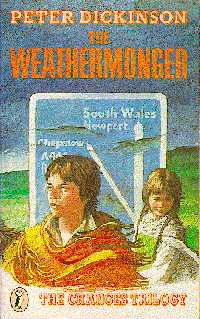
'Most western powers - France, America, Russia, Germany - have sent agents in to your island, but very few have returned. Some, we think, were killed, and some simply decided to stay: "went native", you might say. Those who did return brought no useful information, except that the island was now fragmented into a series of rural communities, united by a common hostility to machines of any sort, and by a tendency to try to return to the modes of living and thought that characterized the Dark Ages. The agents themselves say they felt similar urges, and were tempted to stay too.
'Of course at first we tried to send aeroplanes over, but the pilots, without exception, lost confidence in their ability to fly their machines before they were across the coast. Some managed to turn back but most crashed. Then we tried with pilotless planes; these penetrated further, but were met with freak weather conditions of such ferocity that they were broken into fragments.
'Despite these warnings, a number of English exiles formed a small army, backed financially by unscrupulous interests, and attempted an invasion. They said that the whole thing was a communist plot, and that the people of England would rally to the banner of freedom. Of the three thousand who left, seven returned in two stolen boats. They told a story of mystery and horror, of ammunition that exploded without cause, of strange monsters in the woods, of fierce battles between troops who were all parts of the same unit, of a hundred men all charging spontaneously over a cliff, and so on. Since then we have left England alone.

Television Heaven - no Changes yet but lots and lots of excellent and original reviews etc. http://www.televisionheaven.co.uk/whitehorses.htm
super-dooper http://tv.cream.org
The Changes - A short section on the series and other apocalyptic TV series' http://www.gnelson.demon.co.uk/tripage/patv.html
More questions about The Changes or other obscure UK TV programmes? Visit the Cult TV forum: http://www.futurenet.com/forum/culttvforum_frm.htm
Peter Dickinson book list http://www.funet.fi/pub/doc/literary/bibliographies/Dickinson_P
More recent work by Peter Dickinson- commentary http://128.220.50.88/demo/lio/19.2lenz.html
¹Home, Anna; Into the box of delights : a history of children's television, BBC Books, 1993, ISBN 0563360615 (hbk)- and that's all the producer had to say about the series! She's now head of Children's Broadcasting at the BBC.
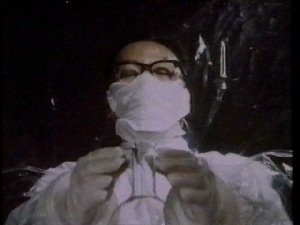 Other
obsessive TV zones
Other
obsessive TV zones
Top stuff from Rob Meade in Suffolk - a dedicated and true fan of the series http://www.bobmeades.supanet.com
Survivors site with other stuff too http://www.roundel.demon.co.uk/index.html
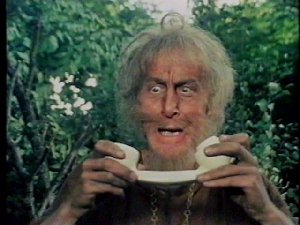 Catweazle
Catweazle
The hapless magician and his pet toad Touchwood are trapped nine hundred years ahead of their time. From his secret home in an old water tower farmer's son Carrot gives him a child's eye introduction to the modern world.
by Richard Carpenter (First broadcast in February 1970)
Available in individual 4 episode volumes or boxed sets from 'all good stockists' or direct from Network Video / Sound and Media Ltd.. Second series now available too.
Network Video / Sound and Media Ltd.
Telephone 01737 616714
Website:
http://www.network-sam.co.uk
Address: Unit 3, Wells Place, New Battlebridge Lane, Redhill, Surrey, RH1
3DR, UK.
Adults and children are entranced by this 1958 East German fairytale directed by Francesco Stefani.
Princess Thousand Beauty learns kindness and humility when the dastardly treatment of her suitor renders him victim to a cruel spell. Her penance is to be an ugly hag and only the power of the legendary Singing Ringing Tree can restore her with its song and mark her passage to maturity.
Photo of Princess Thousand Beauty and description in:
Tibbals, Geoff - The Golden Age of Children's Television
Print Source: Westbourne Films 0171 221 1998
What about that eerie theme music!
Available in 4 volumes from local stockist or direct from Network Video /
Sound and Media Ltd.on 01737 616714
Website:
http://www.network-sam.co.uk
Address: Unit 3, Wells Place, New Battlebridge Lane, Redhill, Surrey, RH1
3DR, UK.
Dalekmania page http://www.geocities.com/Area51/Cavern/6804/dalek.html
http://www.btinternet.com/~c_p_smith/doomwatc/doomwatc.htm
http://freespace.virgin.net/peter.culley/doomwatch.htm
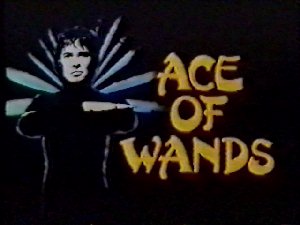 Ace
of Wands
Ace
of Wands
Ace of Wands page http://www.aceofwands.freeserve.co.uk/ace.htm
The Tripods - An excellent website but not a very good series, whoever did the casting for this programme wants 'capping' It can be used as an example of how not to cast a drama, terrible acting lets down a reasonably good script. http://www.gnelson.demon.co.uk/Tripods.html
One good site - there are several more http://easyweb.easynet.co.uk/~davej/ttp/index.htm
Children of the Stones http://www.btinternet.com/~sarsen/children/index.html
I remember this to be a brilliant little series of dramas bout a group of English travelling players - I think they were roughly sixteenth seventeenth century types - I can't remember exactly - but even as a young child - around 9 or 10 I guess - it struck me as a show I must go out of my way to see again. Alas I never did.
The following is from http://www.tvchronicles.com/kidstvp.htm
UK / HTV / 3x30m-e / 19??
Writer: Paul Nicholson / Producers: Patrick Dromgoole, Leonard White / Director:
David Boisseau
Period drama serial. Three children get mixed up with soldiers during the
Wars of the Roses.
With:- FREDERICK JAEGER as Joachim / CURTIS ARDEN as Elam / ELIZABETH ROBILLARD
as Perfect / NEIL McCARTHY as Henschall / ROBIN NEDWELL as Parsons / HEDLEY
GOODALL as Betterbridge / JONATHAN NEWTH as Morton.
 Terry
Nation
Terry
Nation
Blakes Seven, Doctor Who, The Survivors. One of the best writers and drama script editors in the English language. Incredibly underacknowledged.
Terry Nation, who has died aged 66, was best-known as the creator of the fearsome Daleks, who persecuted Dr Who with cries of "Ex-ter-min-ate!". He was also a highly professional British television and film scriptwriter who, like several others, ultimately rather lost his way in the very different climate of California.
Tall, and with a ready intelligence and an ability to come up with ideas without windy script conferences, he took umbrage in the 1960s when, after the animated dustbins with croaky voices had first become popular, he was asked whether the Daleks had made him a rich scriptwriter. He was, he replied, already a rich scriptwriter - from shows such as THE SAINT, THE AVENGERS and THE PERSUADERS. His belief was that television should "take viewers away from their daily toil".
Romantic notions that writers should suffer poverty and personal unhappiness to feed their art were readily shipwrecked on the facts of Nation's successful, prosperous and happy personal life - in which, at one point, his wife Kate's parents lived with them in their large white Kent mansion while his parents had a house in the grounds. In 1980 when he went to Los Angeles, where he has died of emphysema, to live and work, it was not because opportunities were fading in Britain, but because he saw it, wrongly, as an expanding opportunity, something he had dreamed about for a long time. None of his projects there took fire with the same intensity as his British creations.
Nation wrote mostly, and quite happily, to order, pounding his typewriter keys from 8.30 am to 6pm, but the Daleks were his own brainchild. They almost missed being conceived. He was writing scripts for Tony Hancock in Nottingham when his agent told him the BBC wanted him to do a children's series. He had never done a children's series before and his first reaction was that the job was beneath him. He told his agent he was definately not interested. Back in London and without a job, he found his agent shrewdly hadn't passed his irate refusal on to the BBC. He was therefore free to accept work for the Dr Who series which the BBC was then devising.
Nation and his wife Kate, by whom he had two children, Rebecca and Joel, were then living in a Hampstead flat, which became a script conference suite as he worked out with her the sort of characters that might fit into such a concept. The Daleks were one idea, though he could never remember how the name came about. He told the BBC about how he saw them and what they sounded like. Raymond Cusick, a designer on the staff, prepared an illustration for the BBC top brass to ponder over, including the mechanical hands and the electronic eye.
The unearthly creatures were not in the first instalment of the cult children's series in 1963. They did not make their gratingly sinister contribution until the fifth episode, but they soon captured the imagination of British children and in the many countries to which the BBC sold the various series. They were credited with saving the show by enhancing the audience from a previously unacceptably modest level.
The Daleks, who Nation thought succeeded because everyone in any audience was always interested in dominating other people, made him better off than most TV scriptwriters could dream of. Two years after the TV series started, the feature film DR WHO AND THE DALEKS made him even richer. He took a fee estimated at almost 300,000 pounds for the rights and the script which he wrote himself - a major fortune at the time - and shared with the BBC in the spin-offs, including Dalek dolls and other toy merchandise, which were said to be worth some 50,000 pounds a year.
This was all on top of the fee Nation had already received for BBC TV dramas, 12 episodes of THE SAINT and other work on TV series - which paid better than the work he had done previously writing comedy routines for Hancock, Harry Worth, Peter Sellers and Frankie Howard. And it was only 10 years since Terry Nation had, at 22, come to London from Cardiff where his father had just given up the furniture factory for which Terry had acted as travelling salesman after leaving school.
Nation came to London carrying a satchel full of the jokes written by himself which he hoped he could use as a stand-up comedian. Though he did have many of the necessary attributes - he was certainly no blushing violet - his efforts to get work in that quarter quickly foundered. In four auditions he found the audience totally unresponsive - he was told the jokes were fine, it was just that he himself was not funny. He decided that his future almost certainly lay in his pen rather than his stage persona.
His eye went straight to the most celebrated comedy programme of that time, the BBC's GOON SHOW, and he asked its most anarchic member, Spike Milligan, if he could write for it. Milligan, badgered for scripts by many shows, agreed, gave him 10 pounds because he thought he looked half-starved, asked him to write a Goon Show and set him off on his career writing for comedians and then TV series.
After the success of Dr Who, Nation branched out, as he saw it, by writing more as he wanted to, including the book REBECCA'S WORLD, named after his daughter, THE SURVIVORS television series about those who escape the end of the world, and BLAKE'S SEVEN.
When he went to Los Angeles with his family in 1980, it was in the hope of reproducing his success on a larger canvas. To some extent he achieved this, since the scriptwriting fees from a succession of Hollywood studios were handsome and supported a handsome lifestyle. He also acted as a consultant on Steven Spielberg's Dr Who feature film and became a well-known figure on the Californian media circuit. He remained a craftsman who could devise an arresting storyline, but did not create anything nearly as memorable as those horrid Daleks.
People living near or working close to powerlines may face an increased risk of disease. This is the possible implication of two theoretical studies published by a Bristol University team in the International Journal of Radiation Biology today, 2 December 1999.
In their first paper, the team, led by Professor Denis Henshaw and financed by the Foundation for Children with Leukaemia, The Starfish Trust (formerly the SPANDEX Foundation), the Department of Health and the Medical Research Council (MRC), used detectors to measure pollutants. The results on the models suggest that there may be a similar increased deposition on the skin of people below powerlines.
The researchers calculated the possible dosages which could be received by human beings living or working under powerlines and suggest that such people could have a increased risk of disease.
The results may explain the known association between living near powerlines and an increased risk of leukaemia. Outdoors, pollutants land on the body at 10 times the rate of indoor deposition. Even persons spending only 10% of time outdoors will receive at least half their dose from their outdoors exposure. That is without the effect from powerlines. When the powerline effect comes into play the total deposition of small pollutant particles is greater. The observation is important because airborne pollution carry agents, and some of them are known from other published studies to cause cancer.
The Bristol team carried out over 2,000 experimental observations in a number of sites in open fields near Bristol. These showed that changes in wind speed or direction or weather changes such as rain or snowfall do not reduce the doses and in certain conditions may even increase it.
The second paper suggests the possible internal doses that could be received by a human body. The Bristol team suggests that the risk to humans of enhanced exposure is not confined to the area immediately under the powerline. Powerline cables collect dirt, which causes them to emit corona ions. These corona ions can cause harmful pollutant aerosol particles to be more heavily charged with electricity. Measurements of the numbers of corona ions show that they are carried in high concentrations by the wind for distances up to 500 metres from the powerlines.
The electrical charge carried by the aerosols increases the way in which they are retained internally by the body when inhaled. Since the aerosols carry cancer-causing and disease-causing agents, the recipients’ risk of disease is increased.
The electrical charge carried by the aerosols increases the way in which they could be retained internally by a human body if inhaled. Since the aerosols can carry cancer-causing and disease-causing agents, the risk of disease could be increased.
Introducing the papers today in London Professor Henshaw said: ‘We suggest that these results may be relevant to the reported associations between high voltage powerlines and childhood and adult leukaemia. There is evidence that links childhood leukaemia to traffic pollution and this suggests that the links between the powerlines and the disease could be considered causal. The dosage rates that we have calculated in this internationally peer reviewed paper suggest that there is a need for further studies. While the risk of leukaemia is small, it may be an avoidable risk. It confirms that the American Government’s policy of not siting houses close to powerlines is well founded.
‘We are grateful to the Foundation, the Starfish Trust, the Department of Health and the MRC and the International Journal for funding this work. Because of international interest we have placed a summary of our findings in several languages on our website. We have also conducted some further research not published here that confirms the effect that we describe is found in several European countries with slightly different powerlines to those whose effects we have measured in the United Kingdom.’
The two studies published in the International Journal of Radiation Biology are:
Dr A P Fews, Professor D L Henshaw, Mr P A Keitch,
Mrs J J Close and Mr R J Wilding: Increased exposure to pollutant aerosols under high voltage power lines.
Dr A P Fews, Professor D L Henshaw, Mr R J Wilding and Mr P A Keitch: Corona ions from powerlines and increased exposure to pollutant aerosals.
Professor Henshaw will be available for interview at the press conference and on Thursday 2 December. If you would like to arrange an interview with Professor Henshaw on Thursday 2 December, please telephone the Information Office tel (0117) 928 8896/8086/7777, fax (0117) 929 2396 or
email info.office@bristol.ac.uk
A summary of the team’s findings is available from 12 noon today, Wednesday 1 December at http://www.electric-fields.bris.ac.uk
If you would like a copy of the two studies published in the International Journal of Radiation Biology, please visit the online journal: http://www.catchword.com (select ResearchJournals/ Browse/International Journal of Radiation Biology). The articles appear in volume 75 no 12. Please note there will be a document delivery fee to be paid. Alternatively, please contact the British Library Document Supply Centre.
Brilliant anti-pylon University site with lots of goodie and baddie links http://www.electric-fields.bris.ac.uk/
Powerwatch exists to help the growing number of people wishing to know more about electromagnetic fields (EMFs) and their reported adverse health effects. http://www.powerwatch.org.uk
• The NIEHS issues its report to Congress, which concludes that the evidence that EMFs pose a cancer risk cannot be dismissed. Though this evidence is weak, the NIEHS says, it is reason enough for prudent avoidance (see p.1).
• EMFs are linked to as much as a sixfold increase in the risk of leukemia among young children, in a new study released by the University of Toronto (see p.12).
• Dr. Robert Liburdy agrees to withdraw three graphs in seven-year-old papers on EMF effects on cellular calcium (see p.1).
http://www.microwavenews.com/
Pylons cause cancer - 'Cars + Cables = Cancer' - a recent conference held by this department http://www.bris.ac.uk/Depts/Medphys/research/boiphys/biophysics.html
Newsletter from Ireland on the Cobh campaign and anti-pylon movement. Lists anti-pylon picnics etc..
Details some of the health risks of living near pylons - headaches, fatigue, childhood cancer, leukaemia, lymphoma, depressive illness, severe headaches, suicide, weakening of white blood cells, infertility, tumor formation, degenerative diseases, dizziness, ear-buzzing, nausea, digestive disorders, irregular periods, epilepsy and alzheimers disease have ALL been linked by experimental evidence to the invisible Electro Magnetic Fields emmitted by power ines. Nicky was not crazy at all!
The Examiner garnered much of this information from Powerwatch UK and articles by John Royds founder of SPARKS (Stop Powerlines Across Residences Kindergartens and Schools). Contact the Examiner's mobile phone +353 (087) 228 7887
Another contact is Cork Environmental Alliance on (Irish republic) 021 272 277
A camp has been set up in Cohb, Ireland, against plans by the evil Irish Electricity Supply Board to erect an immoral 15 mile ring of pylons around Cork harbour.
The local Chamber of Commerce have PAID for protesters to be transported across the country from the 'Glen-of-the-Downs road protest near Dublin to save them from the bad wires.
Electromagnetic fields could affect residents' health and campaigners are demanding the cables be laid underground. Contact +353 (087) 451065
Dr. Roger Coghill has never been one to allow his research to be stifled or silenced by the power of big business nor the clout of capital. As we enter the 21st Century no business is growing as fast as the mobile telecommunications industry.
Its financial muscle is immeasurable.
It could however be damaged by Dr Coghill's terrier persistence in pointing out the possible dangers to public health from mobile phone technology. Since the publication of his definitive work "Electropollution" in 1990, the South Wales based scientist has voiced scientific concerns about links between electromagnetic fields and immune deficiency illnesses. Now in an exclusive interview with the Press and Journal Dr Coghill claims he has made a "ground-breaking" discovery which confirms a direct link between proximity to mobile phone masts and an array of health disorders. His findings will be presented to two NATO conferences next month and published by a specialist medical journal in March.
His research comes amid growing concern in the North-east over the siting of mobile phone masts and claims of linkages between electromagnetic radiation, childhood leukaemia and auto-immune disorders such as ME and multiple sclerosis.
Electromagnetic energy is given off by electrical currents. It is produced by electric power lines, mobile phones, microwaves, fluorescent lighting, VDUs and even electric blankets.
Dr Coghill claims he has isolated:
But mobile phone companies claim the conclusions are "flawed" and say there is no evidence to suggest a link between phone masts and health problems. Last night Dr Coghill explained his new research to the Press and Journal before its dispersal to the world's scientific community.
"We have known for many years that every living creature has its own self-generating electromagnetic field and this protects the viability of white blood cells, which form an essential part of the body's defences against infection," he said.
"But the puzzle has been how weak radiation from something like a mobile phone mast can have a biological effect.
"Until now all scientific research has concentrated on the magnetic components of mobile phone radiation and this has not fully explained an interaction with human immune systems," explained Dr Coghill. "We have now shown that it is the electrical field component which is the trigger.
"The electrical field emitted by a phone mast or a mobile phone has a super-positive effect and tops up the individual human electromagnetic field.
"This interrupts the viability of white blood cells to fire the immune system and in turn can trigger leukaemia and auto-immune disorders such as ME and Multiple Sclerosis."
Dr Coghill says that even a mobile phone left on standby can damage the viability of white blood cells.
As part of his research he carried out experiments in which blood cells were exposed to radiation from a mobile phone on standby sited 3cm away. After seven and a half hours only 13% of the cells were still intact and able to function.
Another group of cells exposed to the natural electromagnetic fields produced by the human body stayed 70% viable.
Dr Coghill says that while mobile phone masts "vary in density" his studies have determined that they can emit a dangerous effect at a distance of up to 200 metres."
The new research is to be presented to scientific conferences in Slovenia and Moscow next month and will be published in specialist science journal "Electro and Magneto Biology" in March 2000.
However, Dr Coghill has been attacked for discussing his findings before they had been reviewed by other experts or published in a recognised scientific journal.
A spokesman for the Federation of the Electronics Industry, which represents mobile phone manufacturers, said: "Dr Coghill has followed none of the proper scientific protocol."
He said an enormous amount of research had been conducted into the safety of mobile phones and phone masts, and claimed none had produced any real evidence of a risk to health.
But Dr Coghill's new findings are backed by work in the US by Dr James Weaver of the Massachusetts Institute of Technology and Dr Dean Astumian of the National Institute of Standards and Technology who revealed electric field strengths can be extremely low and still affect large molecules in a human cell's membrane which take part in cellular processes.
Seven years ago the Swedish National Board for Industrial and Technological Development said its own research showed a conclusive link between radiation from power lines and phone masts and childhood leukaemias and some forms of adult cancer.
The board subsequently enacted legislation to ban new housing in zones exposed to power lines and placed an embargo on mobile phone masts in residential areas.
Dr Coghill's findings come on back of local protests about the siting of mobile phone masts. This week Mintlaw residents expressed outrage when mobile phone company Orange applied to site a 15 metre mast.
Earlier this year, the town thought it had scored a victory over the company by forcing it to drop plans to put up another mast in a residential area. Now residents say a second application is equally unsuitable, pointing out that it is close to the town's primary school and nursery.
Alison MacLeod, Aberdeenshire councillor for the area said: "We said last time that under no circumstances would we allow a phone mast in a residential area.
"As far as I am concerned, the whole of Mintlaw is unsuitable ... we are going to campaign on this."
A spokesman for Orange said the mast was necessary to boost coverage in the area. "There is no conclusive evidence that makes a link between long-term public health, radio waves and transmitter masts," he said. "Orange operates well within the national guidelines laid down by the NRPB (National Radiological Protection Board) and well within European and international standards."
More than 200 people in Ellon were recently fired into action by a proposal from telecommunications company NTL to replace the nearby Knockothie mast. The mast is shared by two mobile phone companies, a paging company and transmits for two TV stations.
NTL want to replace it with a much bigger one which could be shared by even more companies.
Aberdeenshire Council decided to refuse planning permission for the new mast.
While it was a victory, worried residents still fear the possible health hazards of the existing mast and say they will lobby the council to get it removed.
A spokeswoman at NTL claimed: "There are no health risks from any of our masts". In March this year Aberdeenshire councillors agreed to ban mobile phone masts from its properties.
Aberdeen City Council also placed an embargo on telecommunication masts on school property.
Last night a spokeswoman for the NRPB said its guidelines did not specify criteria for the siting of mobile phone masts but did lay down firm rules on the power radiated from these masts.
She said: "Concerns about possible adverse health effects of exposure to electromagnetic fields from mobile phones and phone masts, including cancer, have been raised.
"The NRPB takes such concerns seriously and has committed considerable resources to addressing this general scientific issue.
"The conclusion of our Advisory Group on Non-ionising Radiation (AGNIR) was that there is no firm evidence that electromagnetic fields cause cancer, but there is a need for further good quality research to be carried out. "The AGNIR continues to review the published literature."